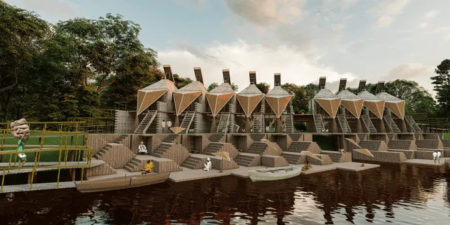[ad_1]
London architect Saumya Ganguli has been named as the winner of the first cove.tool Architectural Design Competition.
On 10 March 2022, London architect Saumya Ganguli was declared the winner of the first cove.tool Architectural Design Competition. The idea behind the competition was to gather and evaluate possible designs for affordable, carbon-negative housing.
cove.tool asked designers to consider how well their ideas could be replicated across different neighborhoods, cities, and countries. There were no limits in regard to the project or to its size. Project could range from a micro-home to a tall building. cove.tool also encouraged entrants to look beyond conventional solutions and consider new and innovative ideas as well.

Winning design for the cove.tool Architectural Design Competition
Individuals and organizations from 104 countries submitted a total of over 1000 entries to the competition. Ganguli’s entry is a design for an innovative environmentally-friendly building project in the Sundarbans in Western Bengal, India.
The Sundarbans is a large mangrove area in Western Bengal. It is situated in the delta formed by the confluence of the Padma, Brahmaputra and Meghna Rivers. It is a low-income, natural disaster-prone area of around 10,000 km², with a hot and humid climate. It is also subject to natural disasters including seasonal flooding, cyclones, hurricanes, and earthquakes.
Background
The 2021 United Nations Intergovernmental Panel on Climate Change Report warned of increasingly extreme weather, including heatwaves, droughts, and flooding. It also warned of key global temperature limits being surpassed in just over a decade. However, scientists say a catastrophe can be averted if the world acts quickly.
Sandeep Ahuja, co-founder and chief executive officer of cove.tool said:
“Without significant intervention, areas prone to climate-related disasters will continue to face housing instability. This competition is an invitation for talented designers to come together and create sustainable designs that can be recreated in communities across the world, helping to fight climate change and eliminate the current housing crisis.”
In the United States alone, the cost of natural disaster damages in September 2020 was USD 50 billion. This was more than the total cost for all of 2019. One-third of all homes in the US are considered at high risk of a natural disaster. Consequently, many homeowners have to bear the brunt of costly repairs.
Buildings such as houses, hospitals, schools, and offices account for around 40 percent of the United States’ total carbon dioxide emissions. They need energy for heating, cooling, lighting, telecommunications, and all the other activities that take place within buildings.
It is also estimated that the manufacture, transport, and assembly of building materials such as wood, concrete, plastics, aluminum, and steel account for another eight percent of energy consumption. About 30 percent of the electricity buildings use is generated from coal-burning power plants. Coal-fired power stations release greenhouse gases, which exacerbate climate change.
About cove.tool
cove.tool is automated building design software for daylight, shadow, energy, carbon, HVAC design and parametric optimization. The software runs thousands of different simulations to find the lowest cost solution to meet performance targets, whether that is simply meeting legislative compliance or achieving net-zero energy building design requirements.
It is one of the latest winners in the 2021 ARCHITECT Magazine R+D Awards. It is also recognized by the United States Department of Energy for its ability to optimize building designs with regard to sustainability.
Related
[ad_2]
Source link
